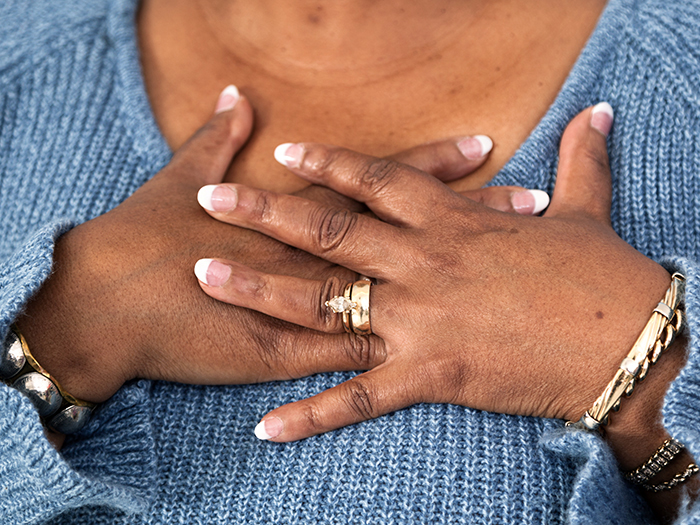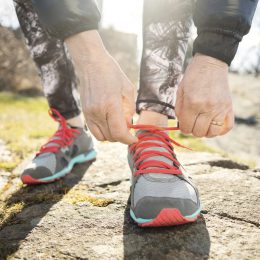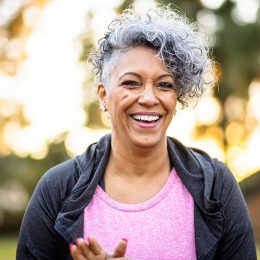6 Ways to Cope with Anxiety—Without Meds
When worry spins out of control, try one of these simple ways to keep calm without a prescription.

When your doctor sits you down to go over test results, you might hold your breath. Giving the big toast at a wedding could make anybody’s heart race. And if you can’t sleep because you’re worried about your 401K or retirement funds after a troubling stock market report, you certainly aren’t alone.
“It’s completely normal to have fears and worries come up as we navigate life,” says Kellie Zeigler, a certified applied positive psychology practitioner in Atlanta. These situational anxieties usually pass with the event.
But if negative thoughts, concerns, and worries get stuck on a continual loop and begin to dominate your headspace and, in turn, muck up your daily routines, it might signify something more serious: an anxiety disorder.
About 9 percent of adults 60 and older have an anxiety disorder, according to the National Institute of Mental Health. But many experts think that the number may actually be higher.
The most common type is generalized anxiety disorder (GAD). Symptoms of GAD run the gamut:
- Feeling nervous, restless, irritable, or on edge
- A rapid heart rate
- Feeling weak or tired
- Trouble concentrating or sleeping
- Digestive problems
- Difficulty controlling feelings of worry
Why Anxiety Is Often Missed in Seniors
Take a second glance at that list. Older adults should be alert to signs of anxiety, says Kevin Gilliland, Psy.D., a clinical psychologist and executive director of Innovation360, a counseling and therapy center in Dallas.
The reason: “The aging process, along with chronic health conditions or physical issues, can often mask an underlying anxiety disorder,” says Gilliland.
For example, many people brush aside absentmindedness as a normal part of aging, although it could be a result of anxiety. Other symptoms of anxiety, like fatigue, irritability, and disrupted sleep, could also be chalked up to getting older, when anxiety may be the real cause.
The challenges that often come with aging—the death of a loved one, downsizing into a smaller home, health problems—can trigger a new, more intense level anxiety than before, he says. What’s more, some older adults who have managed stress well in the past might suddenly find themselves struggling with anxiety that stops them in their tracks.
“Anxiety is one of those things that can easily creep up on a person since the symptoms tend to slowly build up instead of appearing out of nowhere,” Zeigler adds.
It’s time to talk to your doctor if any red flags—from fatigue to fearful thoughts—become too much to bear or get in the way of your daily routines and obligations.
“Stay aware of your symptoms and any changes in intensity or frequency,” Zeigler says. “Remember, there’s no shame in asking for help.”
There’s also no one-size-fits-all treatment for anxiety, and medication isn’t always necessary. In fact, there are several strategies to rein in anxiety that don’t include making a trip to the pharmacy.
1. Sign Up for Therapy
One of the most effective forms of anxiety treatment is called cognitive behavioral therapy (CBT). It’s a type of talk therapy that helps people become aware of and manage their negative thoughts, says Fran Walfish, Psy.D., a family psychotherapist in Beverly Hills, California.
For some, just a handful of one-on-one visits with a trained psychologist, psychiatrist, or social worker can help. For others, group counseling can be especially beneficial, since talking with others can help to normalize anxiety and provide hope.
Check with your health plan for benefits and network information, or check what Medicare covers for outpatient mental health care at medicare.gov. You may also want to check out the American Psychological Association locator tool to find a licensed psychologist near you.
2. Practice Mindfulness
Mindfulness is a form of nonjudgmental awareness in the present moment, Zeigler explains, and it’s been shown to help reduce anxiety and stress.
An easy way to start practicing: Set a timer for five minutes, and take in everything in your surroundings. Notice how it physically feels to be in your body. What do you smell, what do you see, what do you hear?
Take care to notice without judgment—so if you’re noticing someone talking in the distance, for example, you’re not focused on whether they sound angry or excited.
Want a little bit more guidance? Follow along with this meditation you can do every day.
3. Try a Breathing Exercise
A simple rhythmic breathing exercise can help stimulate the relaxation response in the body. A good one: Inhale for a count of four, and then exhale for a count of six. Do this for one minute.
“To calm the body, you want the exhale to be longer than the inhale,” Zeigler notes. “You might feel calm after one minute, or it may take up to 10 minutes of this type of breathing to calm down.”
4. Turn Off the News
Yes, it’s important to stay tuned for updates, especially if there’s bad weather in the forecast or there’s a crisis in your area.
But news tends to be overly negative—and that can really affect your mood and trigger anxiety, says Walfish. She suggests skipping the nightly broadcast and getting the headlines online. This way you can control what you read and how much time you spend keeping up with current events.
If you do stick with your favorite TV news program, she recommends following it up with a comedy or game show to help keep you from getting down.
5. Pay It Forward
When you feel stressed and anxious, try to reach out and do something nice for someone else. A 2017 study found that when people with anxiety and depression helped others, their sense of self-worth rose while their levels of anxiety dropped.
“Being generous creates positive feelings for the doer and gets your endorphins flowing, which can help reduce anxiety,” explains Walfish.
For inspiration, check out these 10 amazing volunteer opportunities that are perfect for older adults. But even a kind word over the phone, email, or text is a step in the right direction.
Subscribe to our newsletter
It's quick and easy. You could be one of the 13 million people who are eligible.
Already a member? Click to discover our 15,000+ participating locations.
Follow Us
6. Make Self-Care a Priority
Practicing self-care is crucial for reducing stress and anxiety, Walfish notes. This touches on every area of your life, such as what you eat, how much rest you’re getting, and how much you move your body.
A fun workout, a short walk, or even a few minutes of mood-boosting exercise can turn around a bad day. It can help you hit pause on a downward spiral of worry and redirect your energy to something more positive. Plus, exercise will improve blood flow and initiate the release of feel-good hormones in your body.
Ask yourself: What will help me most right now? If you’re feeling lonely, reach out to a friend online or by phone. If you can, why not video chat for a more connected experience?
On the other hand, if you’re feeling overwhelmed by caregiving or other duties, allow yourself space and time. Lose yourself in a good book, catch up on your favorite show, or do anything except worry about your to-do list for an hour or two.
Anxiety Medication: What You Need to Know
For some people living with an anxiety disorder, DIY strategies aren’t always enough, and a prescription may be in order.
“Many people need the kick start of a carefully prescribed medication for anxiety,” Walfish says. But it’s incredibly important to get the correct choice and dosage of any anxiety medication prescribed by a well-trained psychiatrist, she says.
One class of medications most older adults should avoid: benzodiazepines, or benzos. This includes:
- Alprazolam (Xanax)
- Clonazepam (Klonopin)
- Diazepam (Valium)
- Lorazepam (Ativan)
In older adults, benzos can increase the risk for cognitive impairment, falls, and motor vehicle accidents—leading to fractures and other serious injuries. Despite these risks, six percent of men and more than 10 percent of women 65 to 80 years old use benzos, according to a study in JAMA Psychiatry.
Benzos may also cause dependency and withdrawal. In other words, it’s possible to get addicted to the prescription drug without meaning to.
Be sure to tell your doctor about any chronic conditions you have and any prescription medications, over-the-counter drugs, and supplements you take. This can help you avoid dangerous drug-drug interactions or other side effects.
Ask about safer alternatives, which may include selective serotonin reuptake inhibitors (SSRIs). If prescribed a medication, take it exactly as instructed, and know what to do in case you experience side effects.
If you have thoughts of wanting to die or harm yourself, seek professional help immediately, or call the National Suicide Prevention Lifeline at 1-800-273-8255.
Check Your SilverSneakers Eligibility Instantly
SilverSneakers members can enjoy SilverSneakers On-Demand workout videos from home. If you have a Medicare Plan, it may include SilverSneakers—at no additional cost. Check your eligibility instantly here.
Already a member? Get your SilverSneakers member ID and exclusive fitness content by logging in to or creating your online account here.





